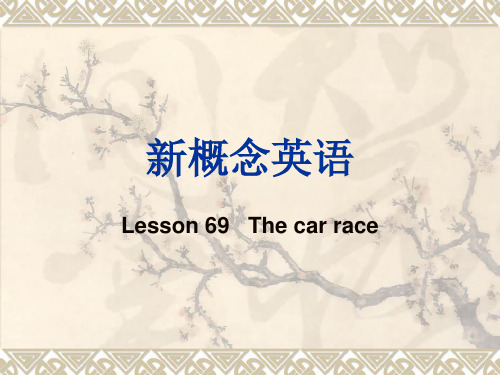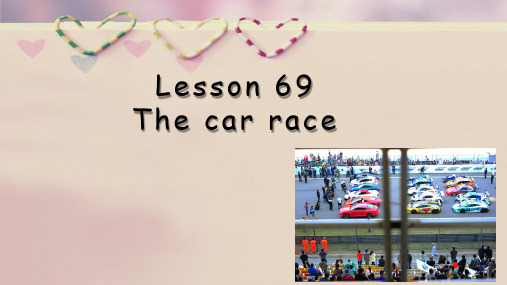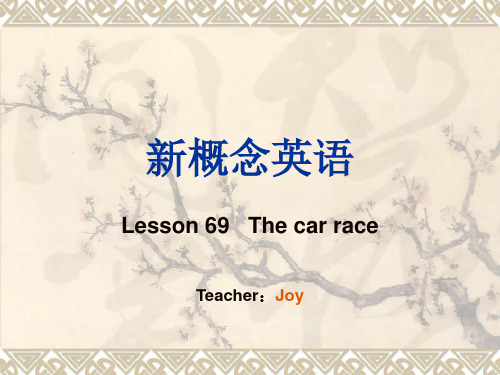新概念英语第一册Lesson 69 The car race
新概念英语第一册Lesson69Thecarrace

[词汇](11)year n. 年race n. ⽐赛(强调竞技性强、激烈的)town n. 城填crowd n. ⼈群stand v. 站⽴exciting adj. 使⼈激动的just adv. 正好,恰好finish n. 结尾,结束winner n. 获胜者behind prep.在……之后way n. 路途(抽象)★race n. ⽐赛car race 车赛in the race 在⽐赛中at the race 在赛场上★crowd n. ⼈群in the crowd:在⼈群中You can see us in the crowd.crowd v.挤上去crowd into 拥护,挤进……get on the bus 上公共汽车crowd into the bus 挤公共汽车I get up at 7 o'clock every morning. Then I crowd into the bus.crowded adj.拥挤的Well, my life is just terrible. Every day I have to get up very early and go to work. And I work in an office. Well, I am very busy everyday. My boss is very cruel to me. I have to work very long every day and I don’t have too much money to take a taxi or buy a car. So every day I have to stand in the crowd for a long time and I have to wait for the bus and when the bus comes, and everyone tries to crowd into the bus, and it is very crowded in the bus. Well, yesterday morning I got up very late and I rushed to the bus stop, it was very crowded there too and I was standing in the crowd. When the bus came and I crowed into the bus again. Of course it was very crowded too. I had to stand in the crowd. Well, that is my terrible life.★stand v. 站⽴① v. 站⽴,起⽴They stood because there were no seats.没有座位,所以他们只好站着。
新概念英语第一册 Lesson 69 The car race

• There were hundreds of people there.
• My wife and I were at the race. • Our friends Julie and Jack were there, too. • You can see us in the crowd. • We are standing on the left.
• • • • • • • • •
crowd /kraJd / n. 人群 集体名词 动词用复数 The crowd are noisy . a crowd of ...一群(人) 只能接人 a crowd of people / students in the crowd 在人群中 You can see us in the crowd . adj. crowded 拥挤的 The bus is crowded .
• Listen to the tape then answer this question.
• Which car was the winner in 1995?
• The car number fifteen .
• There is a car race near our town every year.
• There were hundreds of people there.
• My wife and I were at the race. • Our friends Julie and Jack were there, too. • You can see us in the crowd. • We are standing on the left.
• • • • • •
hundred four hundred one hundred hundreds of ... 成百上千的 hundreds There were _______ of people there . hundred There were three ______ people there .
(完整版)新概念英语第一册69课

❖ There were twenty cars in the race. There were English cars, French cars, German cars, Italian cars, American cars and Japanese cars.
在比赛中
It was an exciting finish. The winner was Billy Stewart. He was in car number 15. Five other cars were just behind him.
新概念英语
Lesson 69 The car race
Word List
❖ crowd ❖ (1)集体名词“人群”,单数名词表示一堆
(一类)人,动词用复数。
❖ 例句:The crowd are noisy .人群很吵。 ❖ (2)in the crowd 在人群中
❖ (3)crowded adj.拥挤的 ❖ stand站立,起立
❖ It was an exciting finish. The winner was Billy Stewart. He was in car number fifteen. Five other cars were just behind him.
在第15号车里
❖ On the way home, my wife said to me, “Don’t drive so quickly! You are not Billy Stewart!”
在人群中
We are standing on the left.
on the right 在右面 turn left 左转 turn right 右转
新概念英语第一册Lesson69

莫莉:你好,这里是联合航空公司,我能帮你做什么吗? 莫莉:你好,这里是联合航空公司,我能帮你做什么吗 戈登:你好,我需要预订一张到纽约的机票。 戈登:你好,我需要预订一张到纽约的机票。 莫莉:您想订什么时候的机票? 莫莉:您想订什么时候的机票 戈登:越快越好。 戈登:越快越好。 莫莉:我们在明天上午10点种有一个航班 点种有一个航班, 莫莉:我们在明天上午 点种有一个航班,你觉得这个时间可以 吗? 戈登:当然,太好了。 戈登:当然,太好了。 莫莉:您需要订几张机票? 莫莉:您需要订几张机票? 戈登:这次就一张。 戈登:这次就一张。 莫莉:您需要哪个级别的舱位?头等舱?商务舱还是经济舱? 莫莉:您需要哪个级别的舱位?头等舱?商务舱还是经济舱? 戈登:商务舱就可以了。 戈登:商务舱就可以了。 莫莉:你需要素食吗? 莫莉:你需要素食吗? 戈登: 我不是素食者。 戈登:不,我不是素食者。 莫莉:吸烟区还是无烟区? 莫莉:吸烟区还是无烟区? 戈登:当然是无烟区。 戈登:当然是无烟区。 莫莉:单程还是往返? 莫莉:单程还是往返? 戈登:我需要一张往返机票。 戈登:我需要一张往返机票。 莫莉:你需要何时回来? 莫莉:你需要何时回来? 戈登: 号星期六返回 号星期六返回。 戈登:11号星期六返回。
Lesson 69 Tressions
Pay more attention
Exciting finish, 激动人心的结尾 Finish my homework The car race Football match
Pay more attention
Dozens of 数十个 Thousands 成百上千个 Millions of 上百万的 dozen, thousand, million后面都要加s, 如果 前面有具体数字,则不加s,例如 Two thousand
新概念一册69课

疑问句:Did+主语+动原+其他 你昨晚回家了吗? Did you go home yesterday? 肯定回答:Yes, I did. 否定回答:No, I didn't.
【搭】finish doing sth. 完成做某事 eg: When will you finish washing your clothes? 你什么时候洗完衣服? ★Notes 1.In 1995, there was a very big race. 1995年举行了一个非常盛大的比赛。 【分析】There be的一般过去时,a very big race 为主语,1995为过去时标志词。
实义动词的一般过去时(2)
肯定句要使用动词的过去式, 否定句和疑问句要借助助动词do 过去式+其他 我昨天九点回的家。(go-went ) I went home at nine o'clock yesterday.
否定句:主语+didn't+动原+其他 我昨天没回家。 I didn't go home yesterday.
3.Our friends Julie and Jack were there, too.我们的朋友朱莉和杰克也去那 儿了。 【分析】一般过去时。Julie and Jack是 our friends 的同位语。 【例句】Our manager Mr. Lee is from Korea. 我们的经理李先生是韩国人。
2.There was hundreds of people there. 数以百计的人都去了赛场。 【分析】There be的一般过去时。 【注释】hundreds of :数以百计的 【联记】thousands of (数以千计的) millions of(数以百万计的) dozens of(数打的) tens of(数十的) 〖注意〗如果hundred,thousand,million前 有具体数字,则不加s。 eg: 两百 two hundred
新概念英语第一册Lesson 69

There is a car 1race near our town every year. In 19295, there was a very big race. There were hundreds of people there. My wife and I were at the3race. Our friends Julie and Jack were there, too. You can see us in the4crowd. We are standing on th5e left. There were twenty cars in the race. There were Eng6lish cars, Fre7nch cars, Germ8 an cars, Ital9ian cars, Ame1r0ican cars and Japa11nese cars. It was an exc1i2ting finish. The winner was Billy Stewart. He was in car numbe1r3fifteen. Five other cars were just be1h4ind him. On the w15ay home, my wife said to me, ‘Don't drive so quickly! You're not Billy Stewart!'
Lesson 69 The car race
New words
year [jɪə] n.年 race [reis] n.比赛 town [taun] n.城镇 crowd [kraud] n.人群 stand [stænd] v.站立 exciting [ɪkˈsaɪtɪŋ]adj.使人激动的 just [dʒʌst] adv.正好,恰好 finish [ˈfiniʃ] n.结尾,结束 winner [ˈwinə] n.获胜者 behind [biˈhaind] prep.在......之后 way [wei]n.路途
新概念英语第一册69课

you and Penny/Australia/July Eg:When were you and Penny in Australia? We were in Australia in July. 1. You / the office / March 23rd 2. You and Sam/home/May 1st 3. Your family/Canada/2010 4. Your sister/Beijing University/last year
Sam / Monday ? School Eg:Where was Sam on Monday? He was at school on Monday. 1.Your father/1996? Here in China 2.you/Match 1st? Home 3. they/November? Turkey 4. Mr .and Mrs.Johnson/the weekend? The country
is,am—was 助动词 do---did are—were 实义动词 eat-ate go-went have-had come-came forget-forgot buy-bought think-thought be 动词
练习
改写下列句子。 用 yesterday 改写下列句子。 1. I am at the church now. 2. My son is at the school today. 3. We are at the office now. 4. There is a bus on the road. 5. Are there any cars here? 6. Here are some butterflies.
新概念第一册Lesson69

BMW 宝马
与阿尔法.罗密欧、菲亚特、福特、梅塞德 斯.奔驰、标致、雷诺、劳斯莱斯等老牌汽 车品牌相比,属于小字辈。但是在20世纪30 年代它却制造出了世界上最好的跑车和豪华 轿车,它从二战的破坏和50年代的财政衰退 中恢复过来。70年代早期,它再度成为世界 高性能和豪华轿车市场上的主角之一,并一 直延续至今。
Fill in the blanks
• There is a race near our town every year.
• In 1995, there was a very big race. There were hundreds of people there. My wife and I were at the race. Our friends Julie and Jack were there, too.
There was an apple on the table yesterday .
were some apples on the table yesterday .
There was a student in the classroom last Sunday .
There were some students in the classroom last Sunday .
There is a car race
汽车比赛
near our town every year.
a horse race 赛马
In 1995, there was a very big race.
在1995年
There were hundreds of people there. 成百上千的
My wife and I were at the race.
- 1、下载文档前请自行甄别文档内容的完整性,平台不提供额外的编辑、内容补充、找答案等附加服务。
- 2、"仅部分预览"的文档,不可在线预览部分如存在完整性等问题,可反馈申请退款(可完整预览的文档不适用该条件!)。
- 3、如文档侵犯您的权益,请联系客服反馈,我们会尽快为您处理(人工客服工作时间:9:00-18:30)。
exciting (1)以ing为结尾的形容词,只用来形容事。
an exciting race / film / book The book is exciting. (2)加ed:excited“感到”。以ed为结尾的 形容词,只用来形容人。I am excited at it. finish(1)n.结尾,结束。 An exciting finish (2)v.“完成”,后接名词。
park ) “在去…的路上” On my way home在我回家的路上。 On the way to yingkou 在去营口的路上 This way, please! 请这边走
语法
1.hundreds of, 数以百计的。
这是用来表示不定数量的复数形式。类似的 结构还有thousands of(数以千计的)
On the way home, my wife said to me, 'Don't drive so quickly! You're not Billy Stewart!'
在回家的路上
句子时态的运用
1. 一般现在时:表示经常发生的事情或者动作。 2. 现在进行时:表示正在发生的事情或 者进行的动
There were twenty cars in the race. There were English cars, French cars, German cars, Italian cars, American cars and Japanese cars.
在比赛中
It was an exciting finish. The winner was Billy Stewart. He was in car number 15. Five other cars were just behind him.
作。 3. 一般过去时:过去发生的事情或者动 作。 Eg: She cleans her room everyday,but
yesterday she forgot to do it.
一般过去时的应用
动词的过去式:在表示过去发生的事情时,句子中
的动词需要用过去式。
动词过去式的变化规则:
1.v+ed
There is a car race
汽车比赛
near our town every year.
每年
In 1995,
在1995年
there was a very big race.
There were hundreds of people there.My wife and I were at the race.Our friends Julie and Jack were there,too.
in+ 年/月/早午晚 in 2013 ; in May ; in the morning on+月日年(具体日期) on Friday ; on June 26th; on April
3rd,1992 at+具体的时间点 at four o’clock
Listen and answer the questions
Sam / Monday ? School Eg:Where was Sam on Monday?
He was at school on Monday. 1.Your father/1996? Here in China 2.you/Match 1st? Home 3. they/November? Turkey 4. Mr .and Mrs.Johnson/the weekend? The
1.定义:表示某地某处有某物。 口诀:‘有’字放前面,有‘啥’放中间,地点
短语放后面。
2.构成: (1)There was + 不可数名词/可数名词单数+
表示地点的介词短语。
eg:昨天在杯子里有一些牛奶。 There was some milk in the cup yesterday。
(1)finish sth .finish breakfast (2) finish +v.ing完成做没事
win (1) v. “赢”; win+sth “赢…东西/事” win the car race (2) winner 赢家
way 路途,名词。 on the way to +名词(school / Beijing / the
介词的用法
At:具体地点 at school at home at the weekend
具体时间 at 6 o’clock On:具体哪一天 on Monday
on 1st August In:模糊时间与地点
in July in China
Exercises
用 at on in 完成句子
1. We were__a_t _the stationer’s_o_n__Monday. 2. We were there___four o’clock. 3. They were___Australia___September. 4. They were there___spring. 5. ___November 25th, they were___Canada. 6. They were there___1990.
Is there year?
Yes, there is.
Was there a very big car race in 1998?
No, there wasn’t.
How many people were there?
There were hundreds of people there.
新概念英语
Lesson 69 The car race
Word List
crowd (1)集体名词“人群”,单数名词表示一堆
(一类)人,动词用复数。
例句:The crowd are noisy .人群很吵。 (2)in the crowd 在人群中
(3)crowded adj.拥挤的 stand站立,起立
关于一般过去时
Eg:I was at the cinema last night. 对划线部分提问 Where were you last night? We were in Australia in July. 对划线部分提问 When were you in Australia?
Exercises
-- Were you at school yesterday ?
-- Yes, I was.
-- Where were you last Sunday ?
-- I was at church.
It was an exciting finish. The winner was Billy Stewart. He was in car number fifteen. Five other cars were just behind him.
在第15号车里
On the way home, my wife said to me, “Don’t drive so quickly! You are not Billy Stewart!”
country
you and Penny/Australia/July Eg:When were you and Penny in Australia?
We were in Australia in July. 1. You / the office / March 23rd 2. You and Sam/home/May 1st 3. Your family/Canada/2010 4. Your sister/Beijing University/last year
上星期在桌子上有一本故事书。 There was a story book on the desk last
week. 变一般疑问句及回答 Was there a story book on the desk last
week? Yes ,there was. No, there wasn’t.
一般现在时与一般过去时的用法 二者之间的转换 动词的过去式 过去式的运用 In on at介词的用法
Lesson 70 When were they there?
现在式:
am
过去式:
was
be
is
are
was were
Grammar :there be 句型的一般过去时
否定句: There wasn’t a story book on the desk
last week.
(2) There were +可数名词复数 +表 示地点的介词短语。
在比赛中有20辆车。 There were twenty cars in the race. 在那里有数以百计的人。
clean-cleaned
2.以e结尾+d move-moved
3.不规则动词:
be 动词 is,am—was 助动词 do---did
are—were
实义动词 eat-ate go-went have-had
come-came
forget-forgot
buy-bought
think-thought
You can see us in the crowd.We are standing on the left.
在赛场上
My wife and I were at the race. Our friends Julie and Jack were
